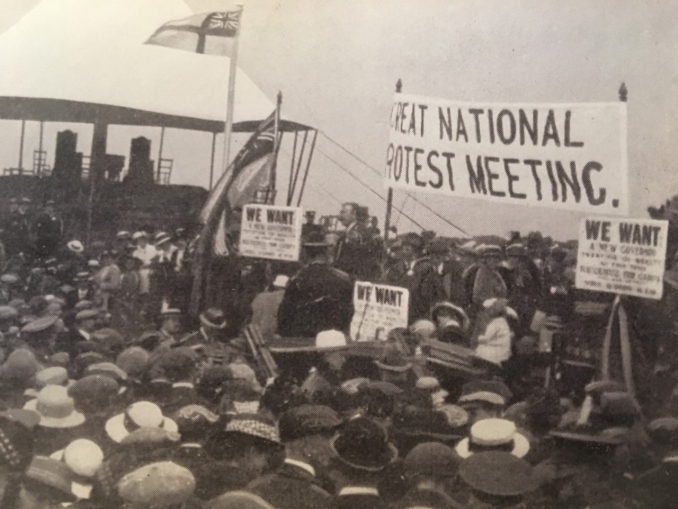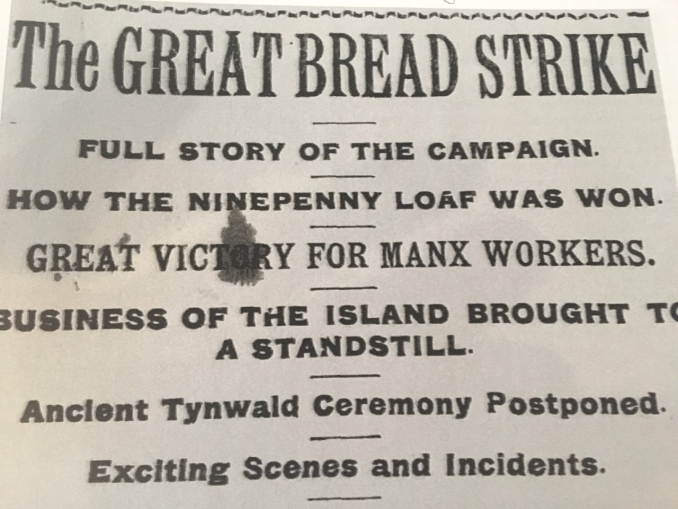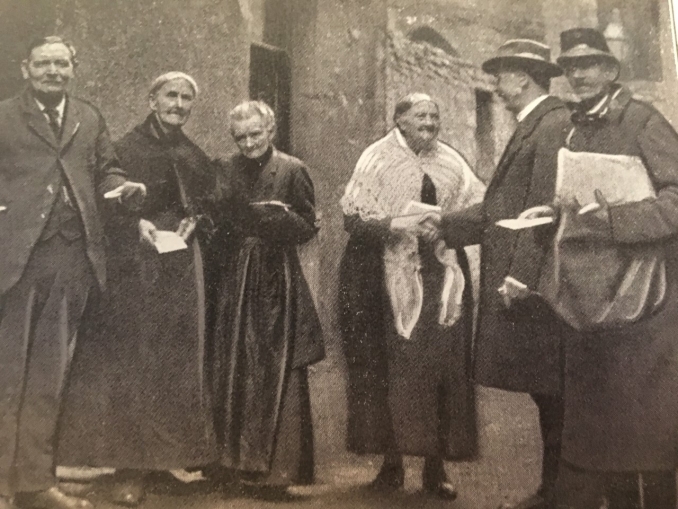Manx General Strike - Public Lecture with Dr John Callow at Manx Museum 7th July 2018
The Great Strike – Public Lecture with Dr John Callow will be held on 7th July 2018 at the Manx Museum at 2pm. This will be the most thoroughly researched presentation ever given on the events that led to and took place during the Manx General Strike. This is the centenary of the 1918 Manx General Strike
The aim of the strike was to ensure that a subsidy on bread be kept in place. However, the roots of the strike go back to a long and protracted campaign for old age pensions. A Manx reform movement had been campaigning for the imposition of an income tax on the Island, originally in order to enable the payment of pensions. Set against the calls for reform was the then Governor Lord Raglan, who had been Governor since 1902. At the Tynwald ceremony in 1916 he had been confronted by demonstrators holding placards calling for the implementation of old age pensions and direct taxation. The Governor was greeted with shouts of 'resign', and one point he was struck by a grass sod thrown from the crowd.
During the years of the First World War this campaign for a pension was temporarily diverted into a fight to get the Manx Government to grant Manx bakers a flour subsidy similar to that given to English bakers to enable a reduction in the price of bread from one shilling to nine pence. This was at a time of great hardship and poverty on the Island. With many being in receipt of poor relief and experiencing hunger and food shortages. Following protest meetings held throughout the Island a committee of enquiry was appointed which resulted in a temporary subsidy from November 26th 1917 to keep bread prices at 9 pence a loaf.
The agreed subsidy was to last seven months until Friday June 28th 1918 and the Governor in his annual financial statement to Tynwald announced the termination of the subsidy. Notice was given by the bakers that from July 1st 1918 the price of the loaf should be increased to one shilling. At the instigation of the Isle of Man Workers Union representatives of the various trade unions on the Island were summoned to a meeting in Douglas on June 29th. At this meeting it was decided that unless the nine penny loaf remained a general strike would be called.
Shocked by the mounting opposition on the island, the Governor then decreed that the price should be fixed at ten and half pence. The peoples representatives stood firm and stated that they would not accept any price over nine pence. This set in motion a series of events leading to the Manx General Strike. A meeting was held attended by the various unions where the campaign strategy was drawn up. A strike committee was set up with representatives of the National Union of Seamen, Typographical Association, Shop Assistants Union and the Workers Union. A thousand strong meeting was held outside of the Government Office in Douglas to announce the strike with word being sent to other parts of the Island. The strike commenced on July 3rd 1918 and resulted in a stoppage of work throughout the Island. The strike was undertaken with some skill and a high degree of organisation.
The use of picketing and direct action was a key to the ultimate success of the strike. The daily steamer from England to the Isle of Man was allowed to sail on the understanding that a return passage would not be allowed. The cargo workers in Douglas ceased work, the schools closed and tram and rail services were halted, shops, offices and factories were shut. A number of incidents arose during the action. A coal yard that attempted to stay open was invaded by a crowd and closed. A minimum amount of work was agreed to be undertaken in the gas works to maintain supplies and when a clerk attempted to do more than was necessary he was escorted home by a jeering crowd. A member of office staff who attempted to drive a tram car was chased away from the depot. A crowd prevented a train from leaving a station by raking out the fires from under the boiler of the engine. Fishing boats were allowed to land their catch but sold the fish at a price fixed by the strike committee to the people. The strike committee also allowed shops in poorer quarters to open between 7am-9am to enable the purchase of food.
The Government had been taken by surprise by the strength of the action and was put into a position of making requests to the strike committee. One such being a request for permission for the members of Tynwald to be allowed to travel to the annual Tynwald ceremony. However, the Governor fearing the possibility of disorder and demonstrations at the ceremony postponed it and for the first time in living memory Tynwald did not take place on July 5th 1918. Stranded tourists to the Island approached the Governor for help to get off the Island, who referred them to the strike committee. The committee refused and the visitors went back to the Governor to ask if a warship could be sent to take them home. This was not done. The Governor had also complied with the strike committee’s requests to keep in camp all military forces on duty on the Island at the time. These were mainly engaged in guarding the wartime alien camps that existed at that time.
On the second day of the strike the Governor asked to see the Strike Committee and again offered a ten and a half pence loaf but this was refused. The Governor then called a meeting of the Legislative Council. Following this a notice was posted outside of all Government buildings:
"Arrangements have been made for the immediate restoration of the ninepenny loaf. The Lieutenant Governor trusts that business will be resumed as early as possible and that no person shall be victimised for participating in the strike."
The Strike Committee called a meeting of some 2000 people and the workers were thanked and asked to return to work. This news was transmitted by telephone and telegram to all parts of the Island. It was the success of the 1918 strike which led to the imposition of an income tax to initially pay for a bread subsidy that later resulted in the introduction of pensions on the Island. Although there were some incidents of victimisation against leading strikers after the dispute, there is no doubt that the Manx General Strike had been successful. This Manx General Strike predated the British General Strike by eight years.
It is fitting at this time that this momentous event in Manx history is remembered. The lecture organised by Manx National Heritage on 7th July is something that should not be missed. Isle of Man Post Office (Oik Postagh Ellan Vannin) are also releasing a First Day Cover commemorating the event on 5th July 2018.










